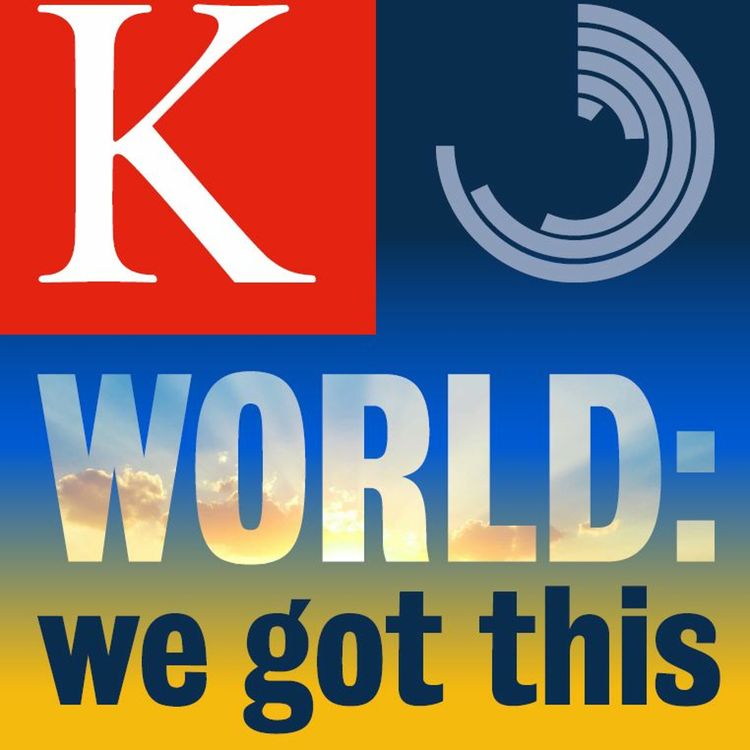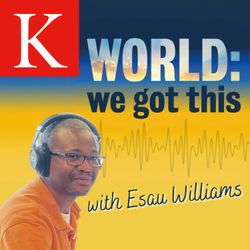Share

WORLD: we got this with Esau Williams
A state of innovation with Dr Robyn Klingler-Vidra and Prof Kerry Brown
•
As governments grapple with the COVID-19 outbreak, we discuss the role innovation can play in helping tackle pandemics.
We speak with Dr Robyn Klingler-Vidra from the Department for International Development about the success Viet Nam has had in tackling COVID-19. This includes an innovative approach to testing. We ask what lessons other governments can learn, and we go on to discuss with Robyn and Professor Kerry Brown, Director of the Lau China Institute, what this pandemic might teach us about the importance of the state in helping drive innovation.
Read more: www.kcl.ac.uk/state-capacity-and-covid-19-testing
More episodes
View all episodes

Too hot to live
41:51|A recent assessment found that the area of Earth's landmass that will be too hot for even healthy adults to keep a safe core body temperature will approximately triple - to an area almost the size of the US – if global warming reaches 2°C above the preindustrial average. We've already reached 1.5°C.This week Esau asks: what does 'too hot' actually mean? What will happen to the people who live in these areas? And what might be done to help combat the impacts?Joining him are Dr Tom Matthews, lead author of the study and Senior Lecturer in Environmental Geography, and Aditya Pillai, who is a doctoral researcher in King’s India Institute, a Visiting Fellow at the Sustainable Futures Collaborative, New Delhi, and author of a recent report investigating India’s readiness for the extreme heat of a much, much hotter world.
7. Dam clever: is world's biggest hydro scheme a good idea?
50:32||Season 6, Ep. 7The proposed Grand Inga dam in the Democratic Republic of Congo would be the largest power station in the world - if its ever built. With twice the output of China's Three Gorges, the dam could potentially bring electricity to those 600 million in sub-Saharan Africa currently without.But after decades of delay, investors withdrawing, environmental concerns, and its ballooning $80bn price tag, does the dream still hold water?Joining Esau this time are Barnaby Dye, Lecturer in Development Policy and Practice; Mark Mulligan, Professor of Physical & Environmental Geography; and Clement Sefa-Nyarko, Lecturer in Security, Development and Leadership in Africa.
6. A Deep Dive into DeepSeek
40:21||Season 6, Ep. 6What is the new app DeepSeek? How does it differ from other LLM providers? And why has it caused such a significant impact on the US AI industry? In this episode, Esau is joined by Sean Starrs and Juan Grigera, from the Department of International Development, King's College London to discuss all things AI.
5. Forty years on from Band Aid, what is the UK-Africa relationship? And what happened at COP29?
01:00:46||Season 6, Ep. 5As the 40th anniversary version of 'Do They Know It's Christmas?' hits the charts, and with Ed Sheeran igniting a row over whether it and similar charity initiatives reinforce African poverty stereotypes, Esau and guests discuss the current state of the UK-African relationship. Plus, what the heck happened in Baku, as COP29 negotiations overran and left many feeling let down? Is the developing nations settlement too little too late?
4. What Trump 2.0 means for Ukraine, India, China and the world
34:12||Season 6, Ep. 4Donald J Trump is set to make a historic comeback as the 47th US President after a decisive electoral victory over Democratic candidate Kamala Harris. In this episode, host Esau Williams talks to Dr Sean Starrs, an expert in international development, and Dr Anastasia Piliavsky, a Ukrainian who studies Indian politics, on what to expect when Trump takes office in January 2025. They discuss the implications of a Trump presidency for India, Ukraine, China, the Middle East, and the rest of the world, and how Trump's MAGA base may influence his policies.
3. Should we super tax the super rich? And what happened at the BRICS+summit
39:56||Season 6, Ep. 3In the wake of the UK budget, and a report from Greenpeace on the feasibility of a wealth tax on the super rich, the panel discuss whether such a measure is possible or even likely. Plus, what happened at the BRICS+ summit, and was it a success for Putin and his allies?Joining Esau this episode are Sean Kenji Starrs, Barnaby Dye, and Benjamin Tippet from the Department of International Development.World: We Got This is brought to you by the School of Global Affairs, King's College London.
2. Spotlight on China – SEZs in Africa, China’s ghost cities and China in the US elections
41:47||Season 6, Ep. 2In this special episode for the Lau China Institute’s China Week, Esau is joined by Dr Charlotte Goodburn to discuss her new report on the impact of China-linked economic development zones in Africa, Dr Jane Hayward explains China’s many vacant cities, and Professor Astrid Nordin and Dr Sean Kenji-Starrs discuss the China question in the US elections. Learn more about the Lau China Institute's China Week: https://www.kcl.ac.uk/china-weekRead about the new report on China-linked SEZs in Africa co-authored by Dr Charlotte Goodburn: https://www.kcl.ac.uk/news/impacts-of-china-associated-economic-development-zones-in-africaLearn more about the School of Global Affairs: https://www.kcl.ac.uk/global-affairs
1. Nuclear energy; Modi in US; September flooding
26:34||Season 6, Ep. 1With Esau this episode: Prof Frans Berkhout talks about the pledge by the big banks to triple nuclear energy by 2050; Dr Anastasia Piliavsky digs deeper into Narendra Modi's visit to the US; and PhD candidate Teyah Payne discusses recent flooding in the global north and south.
9. In conversation about studying loneliness and ageing in Southeast Asia
23:26||Season 5, Ep. 9When Samia Akhter-Khan spent a year in Myanmar with older adults, she became curious to understand how loneliness operates in such social contexts where communities are tight knit. So for her PhD project, she chose to conduct research into loneliness in later life in Thailand and Myanmar. In this episode, Samia talks to her supervisor Dr Rosie Mayston about the challenges of studying loneliness in different cultural contexts, how she learned a new language, and the theory she developed for understanding loneliness. Learn more about Samia's research: https://www.kcl.ac.uk/people/samia-akhter-khan